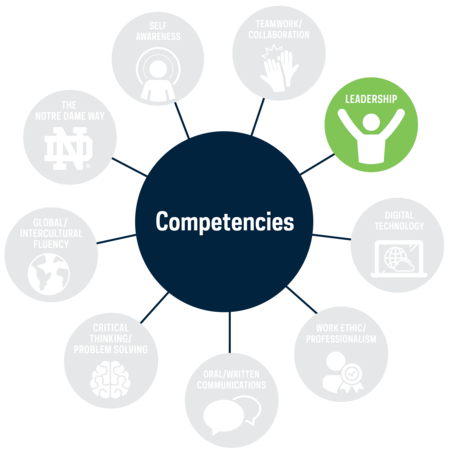Leadership

Leadership
Leadership is the art of motivating a group of people to act toward achieving a common goal, which can include directing other workers and colleagues with a strategy to meet the organization's needs, teaching a class, collaborating with your research team, and more. To be effective, a leader has to manage the resources at their disposal. Leadership also involves communicating, inspiring and supervising. A successful leader understands people’s motivations and enlists participation in a way that combines individual needs and interests to the group’s purpose.
Assessing Your Level of Competency
Graduate School is a time to identify opportunities within your program, on campus, or within the community that will provide roles to assist you in developing this competency. Ask yourself the following questions to dive deep into your self-assessment:
- Do I want to be a leader?
- Can I empathize with different types of people?
- Can I change how I communicate depending on the situation?
- Can I think critically and criticize constructively?
- Can I cope with stress?
- Am I flexible when it comes to different tasks?
- Can I handle fear and anxiety?
- Do I inspire others toward action?
- Am I a forward thinker?
Building Your Level of Competency
Build on your level of this competency through the following:
- Organize others to complete a task, without manipulation and in a way that is mutually acceptable.
- Strategize and stand back in an attempt to see a wider view of the situation.
- Communicate what is happening - and your expectations so others can understand in detail.
- Use “active listening” when receiving support or advice, but be capable of acting without it.
-
Develop your team of colleagues and classmates by seeking ways to accomplish the following:
- Identify the values, interests, personality, and skills (VIPS) they bring to the team, and help them leverage their VIPS for success.
- Contribute to their professional development.
- Help them achieve their personal and professional goals.
- Deal with problems diplomatically and empathetically.
- Consider options without procrastinating and make decisions.
- Be knowledgeable of yourself and your own strengths and limitations.
- Understand the position of others in the organizational hierarchy, as well as your position and the responsibilities that come with it.
- Be aware of personal objectives and parameters.
- Be mindful of the people around you; know their wants, opinions, and agendas. Try to understand their relationships with each other.
- Demonstrate initiative by taking on additional responsibilities.
Communicating This Competency
There are many opportunities to communicate your leadership skills to others through your resume, cover letters, interviewing, 30-second professional introduction, networking, etc. Start with statements like the examples below:
- Participated in Notre Dame’s Leadership Advancing Socially Engaged Research (LASER) program, an experiential training program for Notre Dame PhD students to develop leadership proficiencies and aptitude as well as to explore and build skills for socially engaged research.
- Founded an organization which held meetings to facilitate discussion between club members on how to utilize talents learned from lab experiences later in life.
- As Professional Development Chair of the Graduate Student Government, I collaborated with 3 members who planned and executed 12+ events while managing a budget of $5,000.
Tips:
- Share how you delegated responsibility for a large project and oversaw each division to ensure success of the project.
- Give examples of how you motivated your team to keep moving forward, even if there were obstacles to overcome.
- Address how you managed conflict resolution within your team.
- Explain the importance of effective communication as a leader and how you listened to your team members.
- Demonstrate your problem solving skills as a leader and how you utilized them within your team environment.
Career Ready Competency Tracking Tool
Download the Career Ready Competency Tracking Tool one time from the main Career Competencies webpage, and utilize one document to track the development of all your competencies.